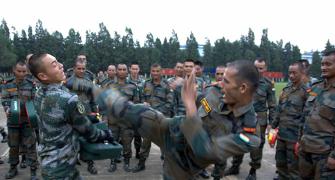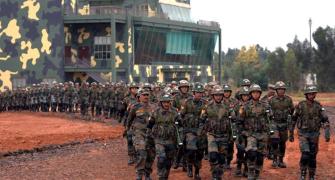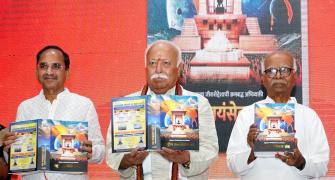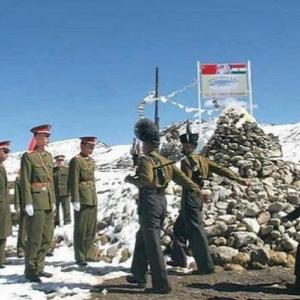The bogey of the 1962 defeat must be laid to rest with a finality that is unquestionable.
The myth of Chinese invincibility is a tall tale that belongs to an era gone by, argues Vivek Gumaste.

China appears to have taken its symbolic representation as a scary, fire-breathing dragon a tad too seriously, full of the the belief that the moment it arches its body upright and spews verbal tinder, its neighbours including India will cower in fear and do its bidding.
The incessant and frenzied drumbeats of war emanating from China vis-à-vis the Doklam dispute are becoming shriller by the day; a vituperative, self-serving narrative that is a strange admixture of sanctimonious hectoring, crude outright bullying that seeks to demoralise India by repeated references to India's humiliating military defeat of 1962, and a military bluster that is more speculative than tested.
An editorial in the official Chinese newspaper the Global Times ('Modi mustn't pull India into reckless conflict,' August 4, 2017) upped the ante even further by threatening to 'annihilate all Indian troops in the border region' and re-emphasised its supposedly overwhelming dominance.
'India is publicly challenging a country that is far superior in strength. It is a war with an obvious result.'
'The government of Prime Minister Narendra Modi should be aware of the PLA's overwhelming firepower and logistics, the PLA is perfectly capable of annihilating all Indian troops in the border region.'
'The Modi government should stop lying to its people that "India in 2017 is different from India in 1962". The gap in national strength between the two countries is the largest in the past 50 years.'
But is the hiatus between the two countries 'the largest in the past 50 years'? The answer is resoundingly in the negative; more a reflection of China's own delusions of grandeur than an objective assessment.
The military debacle of 1962 sparked a comprehensive overhaul of India's army. Today India is a nuclear armed power with the third largest army in the world and an air force and navy comparable to world standards.
The military disparity of 1962 has all but vanished. The India of 2017 is no pushover.
China's supposed military superiority is merely a play of numbers; a simplistic inference that equates surfeit of weaponry with military advantage, failing to factor in other vital elements like combat experience, functional capabilities and logistic geographical advantage.
In terms of combat experience India holds the edge. The Indian Army has been engaged in two full-fledged wars and one limited but significant conflict with Pakistan since 1962; in two of these three India scored decisive victories, with the 1971 War being a magnificent display of India's military prowess and execution.
Compared to this China's forays into the battlefield since 1962 have produced mixed if not disappointing results.
Barely five years after 1962, Indian forces inflicted a crushing defeat on the Chinese army during a border skirmish at Nathu La and Cho La; over 400 Chinese soldiers died compared to 80 to 100 Indian casualties; a clear reflection of the changing military equation between China and India that was noticed by several China watchers.
M Taylor Fravel, an associate professor at MIT, refers to 'the declining claim strength in China's decision to initiate the use of force' against India after the Nathu La and Cho La clashes in his book, Strong Borders, Secure Nation (Princeton University Press, 2008).
More telling is the story of the 1979 Sino-Vietnam war. It was a military debacle of gargantuan proportions, both in terms of casualties as well objectives as this report in The Diplomat indicates (Nguyen Minh Quang, The Bitter Legacy of the 1979 China-Vietnam War, February 23, 2017):
'Scholars like Gerald Segal, Bruce Elleman, and Carlyle Thayer agreed that China's 1979 war was a complete failure. First, Deng (Xiaoping) and his generals failed to induce Vietnam to withdraw regular forces from Cambodia. Second, Beijing also sought to engage main force Vietnamese units near the border.'
'But Vietnam largely held its main forces in reserve and mainly used its militia and local forces to defend against China; thereby China further failed to dispel its image as a paper tiger'...
Even the death toll underlined China's frailty: Over 28,000 Chinese died and 43,000 were wounded, compared to less than 10,000 Vietnamese fatalities.
A comparison of current military strength reveals mixed results: More gray than the black and white China would like us to believe.
China's superiority in missiles and land warfare is more than offset by India's advantage in other areas.
World experts are of the view that the Indian Air Force, despite having a smaller number of aircraft, is more than a match for China. India's air force is in a better position to contest the skies than their Chinese counterparts.
India'air fleet of 230 Su-30Mk1 Flankers, 69 MiG-29s and even its Mirage 2000s are competitive to or even better than most of China's aircraft in theatre, at least until the J-20 fighter becomes operational.
India likely has enough aircraft to deal with a two-front war, facing off with Pakistan's air force at the same time. (Kyle Mizokami, The National Interest, May 27, 2017).
India's trump card is its logistic geographical advantage that has the potential to strangle China's military thrust and disrupt its economy.
China imports over half of its oil from Venezuela and oil-rich nations in Africa and the Middle East; 80 percent of this oil transits the Indian Ocean and the Straits of Malacca -- a 'choke point' that India has the ability to exploit with its powerful naval base in the Andaman islands.
Kyle Mizokami, writing in The National Interest (If 2.6 Billion People Go To War: India vs China, May 27, 2017) warns:
'The war at sea would be the decisive front in a conflict between the two countries. Sitting astride the Indian Ocean, India lies on China's jugular vein. The Indian Navy, with its force of submarines, aircraft carrier the INS Vikramaditya and surface ships could easily curtail the flow of trade between China and Europe, the Middle East, and Africa.
'It would take the Chinese navy weeks to assemble and sail a fleet capable of contesting the blockade. Even then, the blockade would be hard to break up, conducted over thousands of square miles of the Indian Ocean.'
It may sound like a stretch, but India does possess the hypothetical ability to bring China's much vaunted economy to a grinding halt.
India is less vulnerable and stronger than what it was in 1962.
The bogey of the 1962 defeat must be laid to rest with a finality that is unquestionable.
The myth of Chinese invincibility is a tall tale that belongs to an era gone by.
So, India need not be overtly nervous about China's jingoistic sabre-rattling.
India must take a pragmatic approach and stand firm; a stance that sends a clear message to China that its days of trampling over a meek, acquiescent India is over, with the disclaimer that India does not wish to rival China or engage in a military conflict with it.
To defuse the situation, China must instead demonstrate its goodwill by facilitating India's entry into the NSG group, endorse the UN designation of Masood Azhar as a terrorist (as recently as August 2, China continued its technical hold on the matter) and tone down its proxy war with India via Pakistan.
A military clash between the two nuclear Asian giants will not be a replay of 1962.
In fact it will be a disastrous entanglement of apocalyptic proportions for both countries, the region and even the world if allies and other competing interests become a part of that equation; not to speak of its impact on world economy and humongous casualties on both sides.
But it will not the one-sided walkover without any repercussions that China envisions.
To avert such a scenario, China must heed the reality of 2017 and speak the language of the new world order: Mutual cooperation that benefits both countries.
Photograph: Reuters.









